Friday, 29 November
1:30 pm
International Criminal Court
Oude Waalsdorperweg 10
The Hague, Netherlands
Facebook: https://www.facebook.com/events/2808269299399347/
 LET’S PROTEST IN THE HAGUE SO THAT ISRAEL’S CRIMES CAN FINALLY BE JUDGED BY THE ICC !
LET’S PROTEST IN THE HAGUE SO THAT ISRAEL’S CRIMES CAN FINALLY BE JUDGED BY THE ICC !
The Attorney General of the ICC (International Criminal Court based in The Hague), Fatou Bensouda, refuses to handle the complaints filed against Israeli crimes, war crimes and crimes against humanity.
Recently, the Appeals Chamber of the International Criminal Court (ICC) was forced to order her to reconsider her refusal to continue the investigation into the bloody assault and act of piracy by the Israeli navy against the Mavi Marmara, a humanitarian flotilla saling to Gaza. She has until December 2 to review her dossier, butshe is the only one who has the power to decide. (In 2013, the state of Comoros, the country under which the Mavi Marmara was registered, filed a war crimes complaint with the ICC, but Ms. Bensouda decided that she would not prosecute Israel because the crime was “not massive enough”!)
However, even when the crimes of the apartheid regime are obviously massive, as is the case with the Gaza massacres of summer 2014 (more than 2,400 Palestinians killed, including 600 children), Ms. Bensouda is not in a hurry: she has not yet submitted her findings on this case, still “under study” for over 4 years now.
The NGO’s Al-Haq and Al Mezan, and the Palestinian Center for Human Rights have collected countless evidence of war crimes and crimes against humanity committed by Israel (persecution, apartheid, theft, destruction and looting of Palestinian property, and hundreds of killings in the West Bank and East Jerusalem since 2014), and have lodged these complaints with the ICC Prosecutor General, despite Israel’s proven death threats against them.
Similarly, 650 well-documented complaint files concerning the killings and serious injuries of protesters during the March of Return in Gaza have been duly filed with the ICC.
Will they also be thrown into a drawer and forgotten by Ms. BENSOUDA ?
We, men and women of conscience, call for a rally at the ICC in The Hague on Friday 29 November 2019, which is the International Day of Solidarity with the Palestinian People. Join us!
MANIFESTONS A LA HAYE POUR QUE LES CRIMES D’ISRAEL SOIENT ENFIN JUGÉS PAR LA CPI !
La procureure générale de la CPI (Cour Pénale Internationale basée à La Haye), Fatou Bensouda, se refuse à traiter les dossiers de plainte déposés contre les crimes israéliens, crimes de guerre et crimes contre l’humanité.
Récemment, la chambre d’appel de la CPI a été obligée de lui ordonner de revenir sur son refus de poursuivre l’enquête sur l’assaut sanglant de la piraterie israélienne du 31 mai 2010 contre le Mavi Marmara, bateau de la flottille humanitaire en route vers Gaza. Mme Bensouda a jusqu’au 2 décembre pour revoir sa copie, mais elle seule est décisionnaire. (En 2013, l’Etat des Comores, pays sous lequel le Mavi Marmara était enregistré, déposait une plainte pour crimes de guerre auprès de la CPI, mais Madame Bensouda a décrété qu’elle n’engagerait pas de poursuite contre Israël, car le crime n’était « pas assez massif » !)
Pour autant, même lorsque le caractère massif des crimes du régime d’apartheid saute aux yeux, comme c’est le cas avec les massacres de Gaza de l’été 2014 (plus de 2400 Palestiniens tués, dont 600 enfants), Mme Bensouda n’est pas pressée : elle n’a toujours pas rendu ses conclusions sur ce dossier, « à l’étude » depuis plus de 4 ans maintenant.
Les ONG Al-Haq, Al Mezan, comme le Centre Palestinien pour les Droits Humains ont de leur côté collecté d’innombrables preuves de crimes de guerre et contre l’humanité commis par Israël (persécutions, apartheid, vol, destruction et pillage de biens palestiniens, et centaines d’assassinat en Cisjordanie et à Jérusalem Est depuis 2014). Elles ont déposé ces plaintes auprès de la Procureure Générale de la CPI, malgré les menaces de mort avérées qu’Israël fait peser sur leurs membres.
De même, 650 dossiers de plaintes très documentées concernant les assassinats et blessures graves de manifestants lors des Marches du Retour à Gaza, ont été dûment déposées à la CPI.
Vont-ils être également enterrés par la Procureure Générale ?
Nous, hommes et femmes de conscience, appelons à un rassemblement devant la CPI à la Haye le vendredi 29 novembre 2019, à l’occasion de la Journée Internationale de Solidarité avec le Peuple Palestinien
Rejoignez-nous
NEDERLANDS
BETOOG MEE IN DEN HAAG OPDAT DE MISDADEN VAN ISRAEL EINDELIJK WORDEN BERECHT DOOR HET INTERNATIONAAL STRAFHOF!
De procureur-generaal van het Internationaal Strafhof (ICC International Criminal Court), gevestigd in Den Haag, Fatou Bensouda, weigert, de klachten te behandelen die tegen de Israëlische misdaden ingediend werden, oorlogsmisdaden en misdaden tegen de menselijkheid.
Recentelijk is de beroepskamer van het ICC verplicht geweest, haar op te dragen, terug te komen op haar weigering om het onderzoek voort te zetten over de bloedige bestorming, op 31 mei 2010, van de Israëlische piraterij op de Mavi Marmara, schip van de humanitaire flottielje, onderweg naar Gaza. Mme Bensouda heeft tot 2 december om haar kopie te herzien, maar zij alleen beslist. (In 2013 heeft de Unie der Comoren, onder wiens vlag de Mavi Marmara geregistreerd was, bij het ICC een klacht ingediend wegens oorlogsmisdaden. Maar mevrouw Bensouda heeft aangekondigd, dat zij geen vervolging tegen Israël zou instellen, want de misdaad was « onvoldoende massaal » !)
Overigens, zelfs wanneer het massale karakter van de misdaden van het apartheidsregime in het oog springt, zoals het geval is met de slachtpartijen van Gaza in de zomer van 2014 (meer dan 2.400 Palestijnse doden, van wie 600 kinderen), is mevrouw Bensouda niet gehaast : ze heeft nog steeds haar conclusies niet ingediend in dit dossier, dat nu al « ter studie » is gedurende meer dan 4 jaar.
De NGO’sAl-Haq, Al Mezan, evenals het Palestijns Centrum voor de Mensenrechten, hebben van hun kant talloze bewijzen verzameld van oorlogsmisdaden en misdaden tegen de menselijkheid, die sedert 2014 door Israël zijn begaan (vervolgingen, apartheid, diefstal, vernieling en plundering van Palestijnse bezittingen; zelfs van moord op de Westelijke Jordaanoever en in Oost-Jeruzalem. Ze hebben die, klachten ingediend bij de procureur-generaal van het ICC, in weerwil van de bewezen doodsbedreigingen van Israël tegen hun leden.
Er werden ook 650 zeer gedocumenteerde klachtendossiers naar behoren bij het ICC ingediend, betreffende de moorden en zware verwondingen waarvan manifestanten het slachtoffer waren ter gelegenheid van de Marsen van de Terugkeer in de Gazastrook.
Zullen die ook begraven worden door de procureur-generaal ?
Wij, mannen en vrouwen met een geweten, roepen op tot een bijeenkomst voor het ICC in Den Haag, op vrijdag 29 november 2019, ter gelegenheid van de internationale dag van solidariteit met het Palestijnse volk.
Wij rekenen op jou!
ARABIC
دعونا نتظاهر في لاهاي حتى تحاكم المحكمة الجنائية الدولية جرائم اسرائيل
المدعية العامة للمحكمة الجنائية الدولية بهولندا- لاهاي السيدة فاتو بن سودة ترفض دراسة ملفات الاتهام ضد إسرائيل حول جرائم الحرب وجرائم ضد الإنسانية.
مؤخرا غرفة الجنايات فرضت عليها مراجعة رفضها للاستمرار في البحث و التحري على عملية القرصنة الدامية اللتي تعرضت لها سفينة مرمرة يوم ٣١ ماي من سنة ٢٠١٠. أعطت الغرفة مهلة حتى ٢ ديسمبر القادم إلى السيدة بن سودة لمراجعة قرارها و تبقى السيدة بن سودة صاحبة القرار الأخير.
في ٢٠١٣ دولة جزر القمر الدولة الحاملة لتراخيص الملاحة لسفينة مرمرة قدمت شكاية للمحكمة الجنائية الدولية ضد إسرائيل اللتى ارتكبت جريمة حرب ضد سفينة سلمية. السيدة بن سودة قررت أعلنت أنها لن تحاكم إسرائيل، لأن الجريمة “ليست شاملة بما فيه الكفاية “!
لكن رغم شراسة الاعتداءات على غزة، و فداحة اعتداءات نظام الابرتايد و بالأخص في حربه ضد العزل في حرب صيف ٢٠١٤ حيث استشهد أكثر من ٢٤٠٠ فلسطينى، من بينهم ٦٠٠ طفل فإن السيدة بن سودة لا تحرك ساكنا للإسراع بإخراج حكم على ملف في رفوف مكتبها منذ اكتر من اربع سنوات.
المنظمات الأهلية الفلسطيني كمنظمة الحق، الميزان و المركز الفلسطيني لحقوق الإنسان يوثقون عدد كبير من الأدلة حول جرائم الحرب وجرائم ضد الإنسانية تقوم بها إسرائيل من اضطهاد، سياسة الابرتايد، سرقة، تدمير الممتلكات الفلسطينية بالإضافة إلى المئات من الاغتيالات في الضفة الغربية و القدس الشرقية منذ ٢٠١٤ . المؤسسات الغير الحكومية الفلسطينية قدمت هذه الشكاوي إلى المدعى العام للمحكمة الجنائية الدولية ، على الرغم من تهديدات إسرائيل المؤكدة بقتل أعضاء هذه الجمعيات.
وبالمثل ، تم رفع 650 ملف شكوى موثقة فيما يتعلق بقتل المتظاهرين وإصاباتهم الخطيرة أثناء مسيرات العودة بغزة حسب الأصول و القانون أمام المحكمة الجنائية الدولية.
هل سيتم دفن هذه الملفات من قبل النائب العام؟
نحن ، رجال ونساء يحركنا ضميرنا الإنسانى ، ندعو إلى جمع حاشد أمام المحكمة الجنائية الدولية في لاهاي يوم الجمعة 29 نوفمبر 2019 ، بمناسبة اليوم الدولي للتضامن مع الشعب الفلسطيني.
انضموا إلينا.
ONDERTEKENAARS – SIGNATAIRES – SIGNATORIES:
PAYS-BAS/NEDERLAND : BDS Nederland, Het Palestijnse Huis, Palestijnse Gemeenschap – PGNL , DocP – Diensten en Onderzoek Centrum Palestina, Een Ander Joods Geluid (A Different Jewish Voice), Stichting Palestina-Rotterdam.
BELGIQUE/BELGIÊ : Plateforme Charleroi-Palestine, Campagne Européenne pour la levée du blocus de Gaza, Mouvement Citoyen Palestine, La Communauté Palestinienne de Belgique, Coordination Femmes Citoyennes, ESG ASBL – Engagés, Solidaires et Généreux, L’Association Belgo-Palestinienne de Liège, Le Comité Verviers Palestine, BACBI – Belgian Campaign for an Academic and Cultural Boycott of Israel, JOC Bruxelles (Jeunes Organisés et Combatifs), Belgian Committee for the Palestinian Prisoners – BCPP, Antwerp for Palestine, Campagne Free Ali Aarrass, GAPP-Gents ActiePlatform Palestina, Palestina Solidariteit, JOC Verviers, VREDE vzw,
FRANCE/FRANKRIJK : Communauté Palestinienne du Nord (CPN), CAPJPO-EuroPalestine, Avec Naplouse, Collectif Palestine Nord Essonne, Collectif 69 de Soutien à la Palestine, Les Désobéissants, le Collectif Ni Guerre NI Etat de Guerre, Mgr Jacques Gaillot, Pr. Christophe Oberlin, Driss Ettazaoui, Adjoint au maire d’Evreux, Sarah Katz (ISM), Pierre Stambul, Campagne Unitaire pour la Libération de Georges Abdallah, ISM France, AFPS 59, Association des Chrétiens pour l’Abolition de la Torture (ACAT), Droits Devant !! Campagne BDS France Montpellier, Collectif Palestine12-Millau, le Collectif BDS 57. ESSOR Langues & Partages culturels, Palestine Libre Haute Marne, Comité Poitevin Palestine
ALLEMAGNE/DUITSLAND : Annette et Gûnter Groth, Institut für Palästinakunde e.V. Bonn, Salam Shalom Arbeitskreis Palästina-Israel Munich, Le Forum Démocratique Palestinien en Europe, Die Jüdisch-Palästinensische Dialoggruppe München, Palestinien community Deutschland, Union of Palestinien Communities Institutions and Aktivitis in Europe, BDS-Gruppe Bonn, Deutsch-Palästinensischer Frauenverein (Karin Steinbrinker, Salwa Rashmawi, Amal Hamad), DIE LINKE- Bundesarbeitskreis Gerechter Frieden in Nahost, Wolfgang Behr, Günter Wimmer.
ROYAUME-UNI/VERENIGD KONINKRIJK : Dr Derek Summerfield (Institute of Psychiatry, Psychology & Neuroscience, London), Football Against Apartheid, The Palestinian, Expel Israel from Olympic Games (UK), ICAHD UK.
ITALIE/ITALIË : NWRG-onlus New Weapons Research Group (Genova), Assopacepalestina, Cultura è Libertà, Angelo Baracca, Pr. of Physics University of Florence, Invictapalestina, Comunità Palestinese di Roma e del Lazio, Palestina Nel Cuore (Rome), Forum Palestina, CLP( Coordinamento Lombardo Palestina), Donne in Nero di Torino.
LUXEMBOURG/LUXEMBURG : Comité pour une Paix Juste au Proche-Orient (CPJPO). ESPAGNE : Associación Madrid Solidaria Con Palestina.
FINLANDE/FINLAND : The Finnish-Arab Friendship Society. SLOVENIE/SLOVENIÊ : Gibanje za pravice Palestincev. AUTRICHE/OOSTENRIJK : Les Femmes en Noir de Vienne. SUISSE/ZWITSERLAND : Association Switzerland Palestine, ASP/GSP, BADIL Resource Center, Alternative Refugee Center. CANADA : Palestiniens et Juifs Unis (PAJU).
USA : Ann Wright, retired U.S. Army Colonel, Veterans for Peace. SOUTH AFRICA : Palestine Solidarity Campaign (PSC), INTERNATIONAL: SAMIDOUN Palestinian Prisoner Solidarity Network.

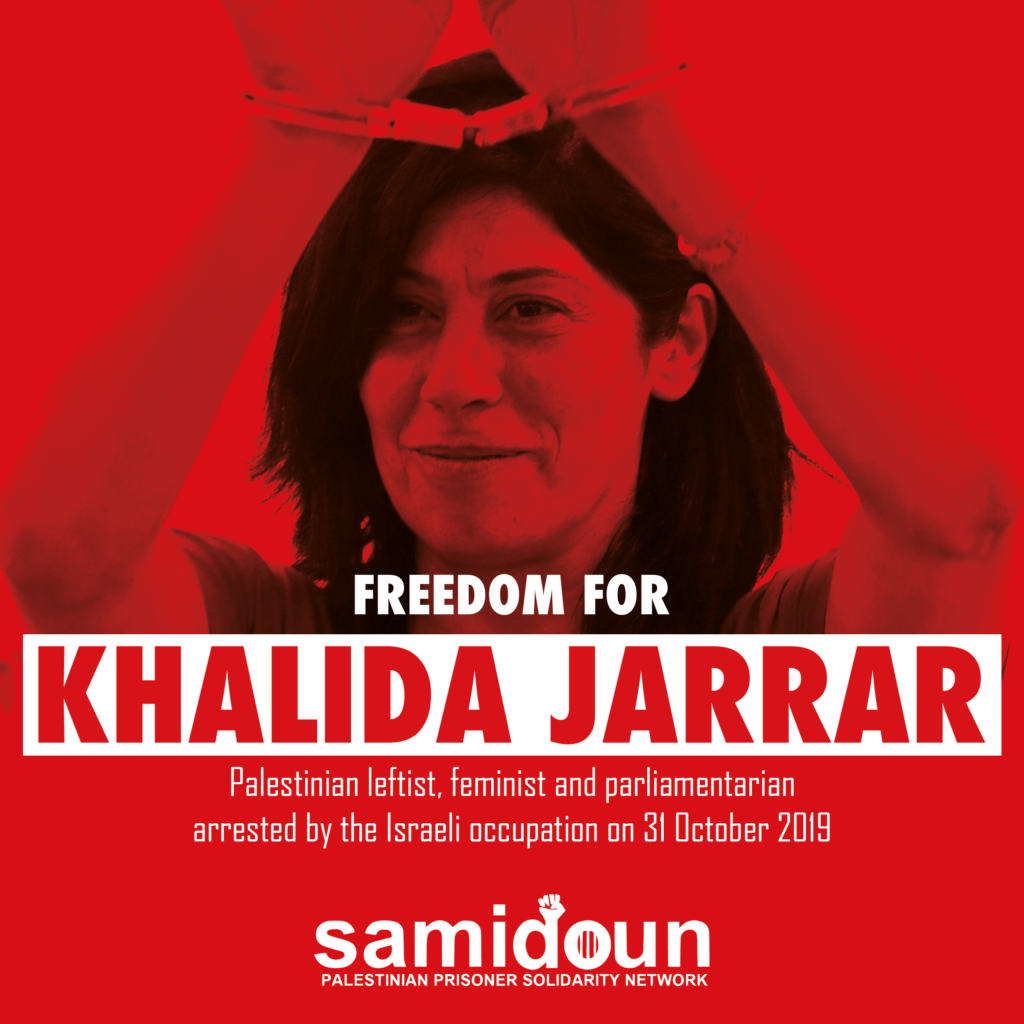
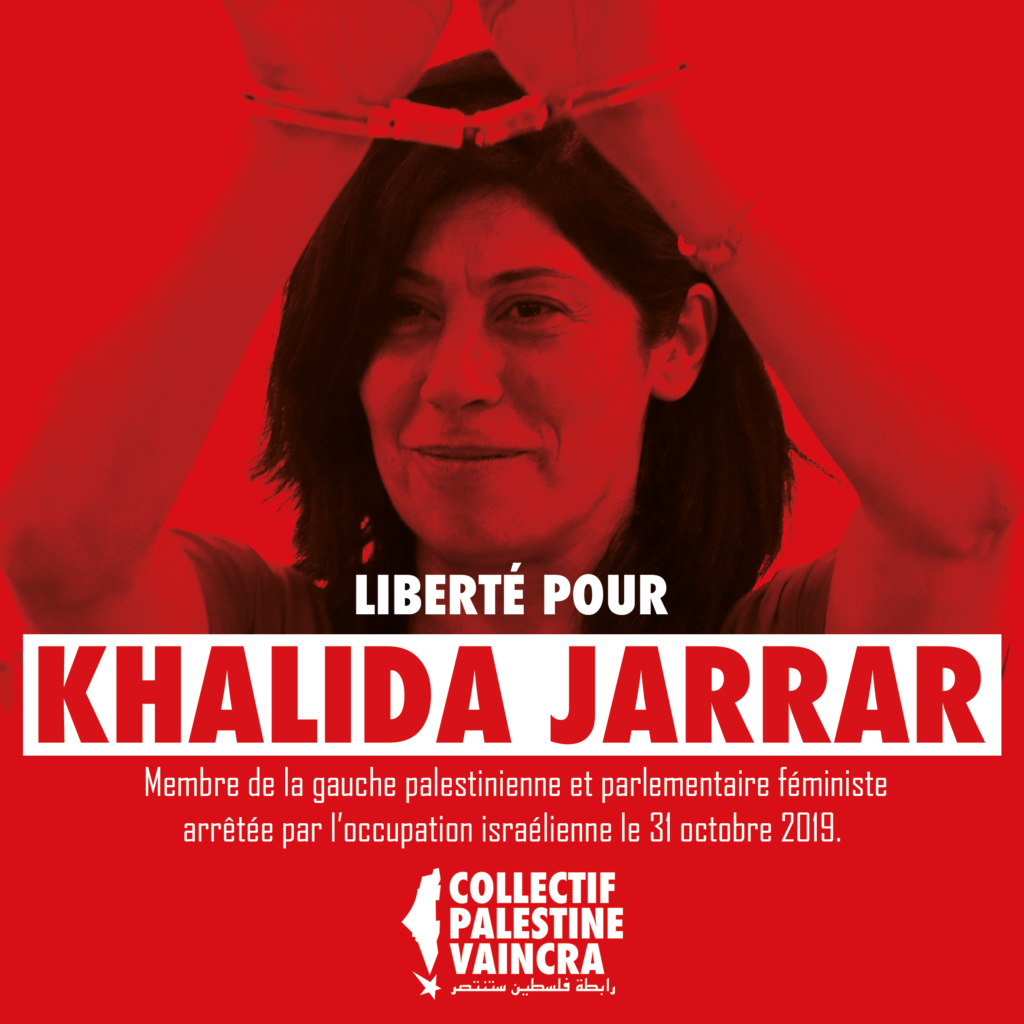
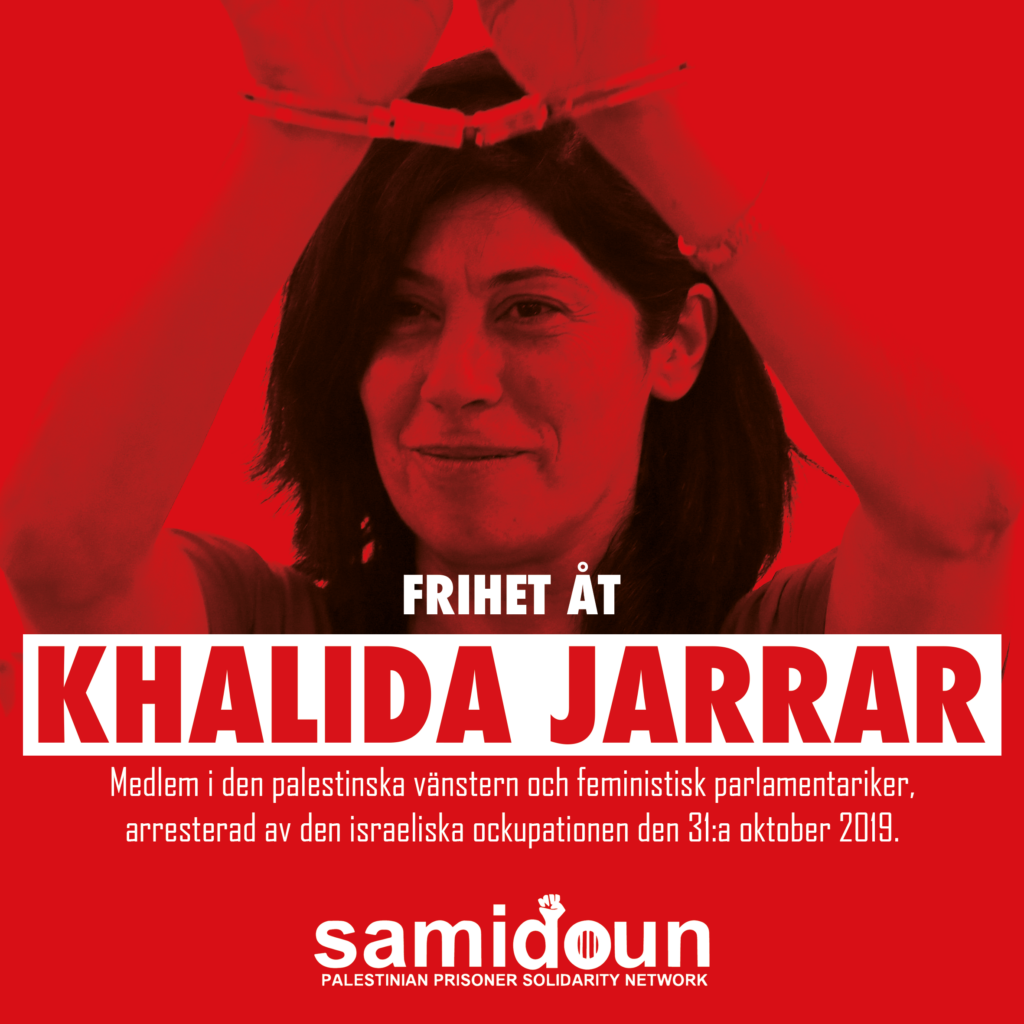
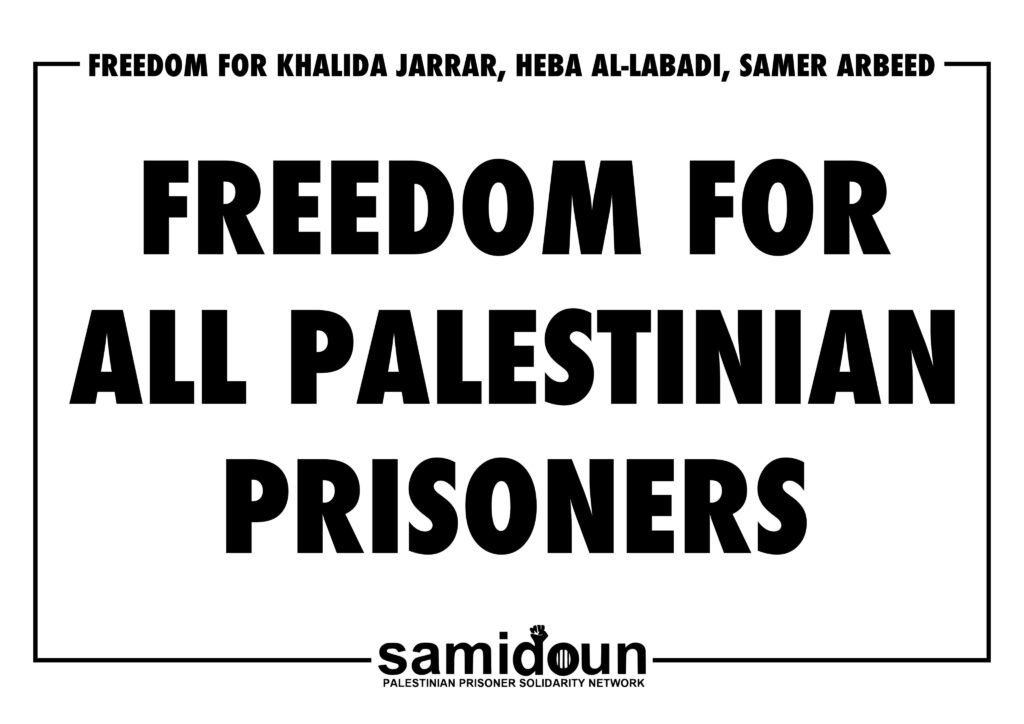
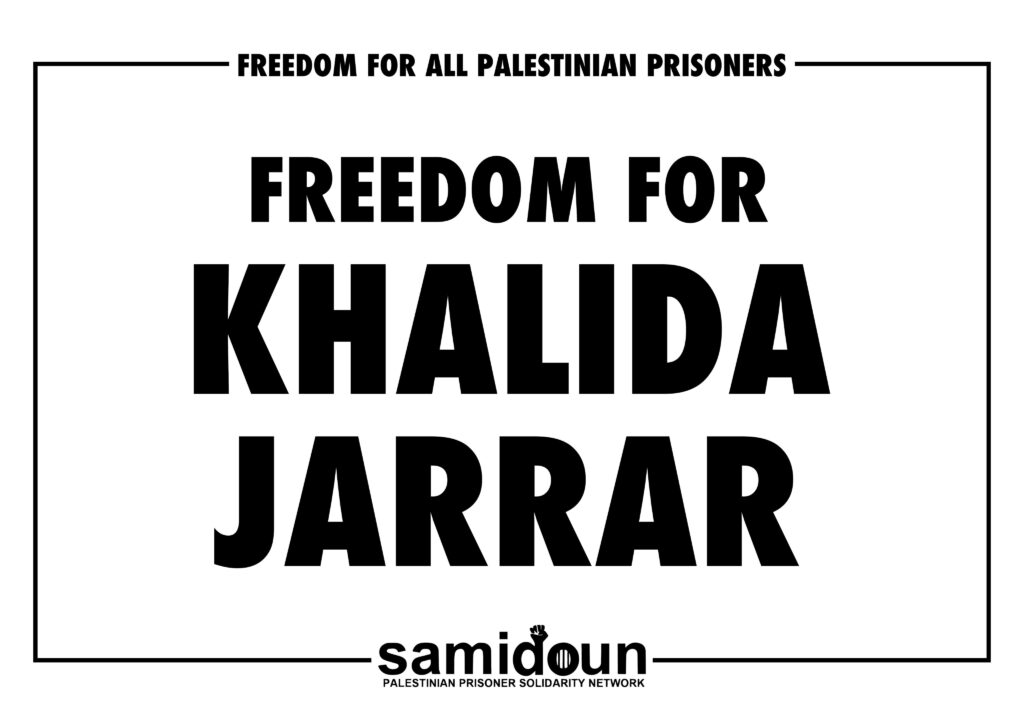
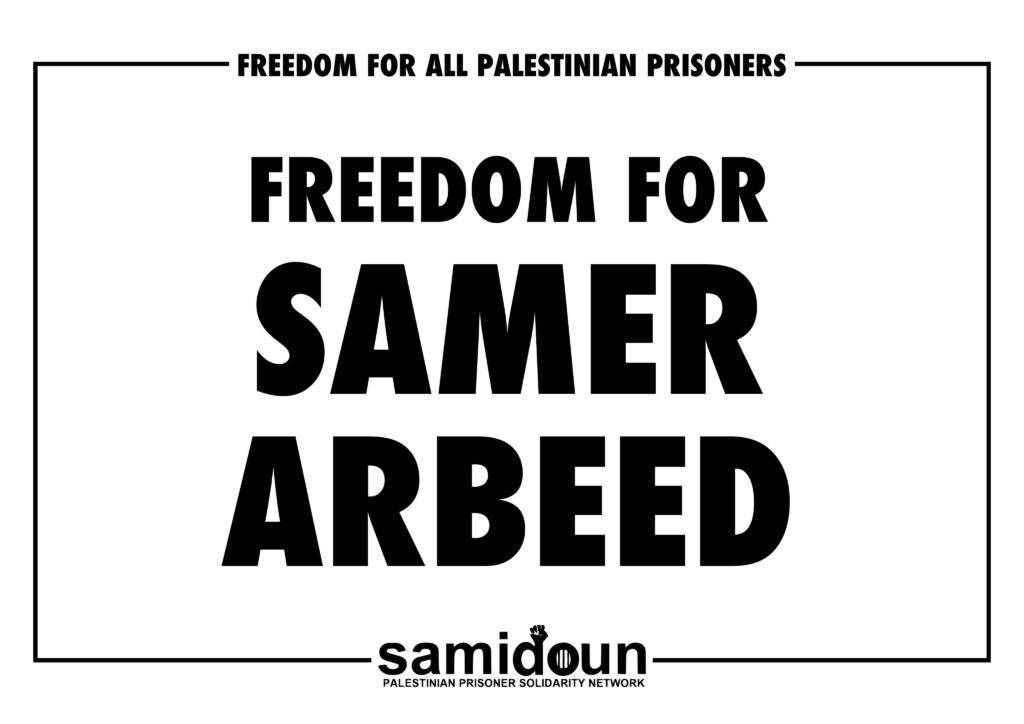
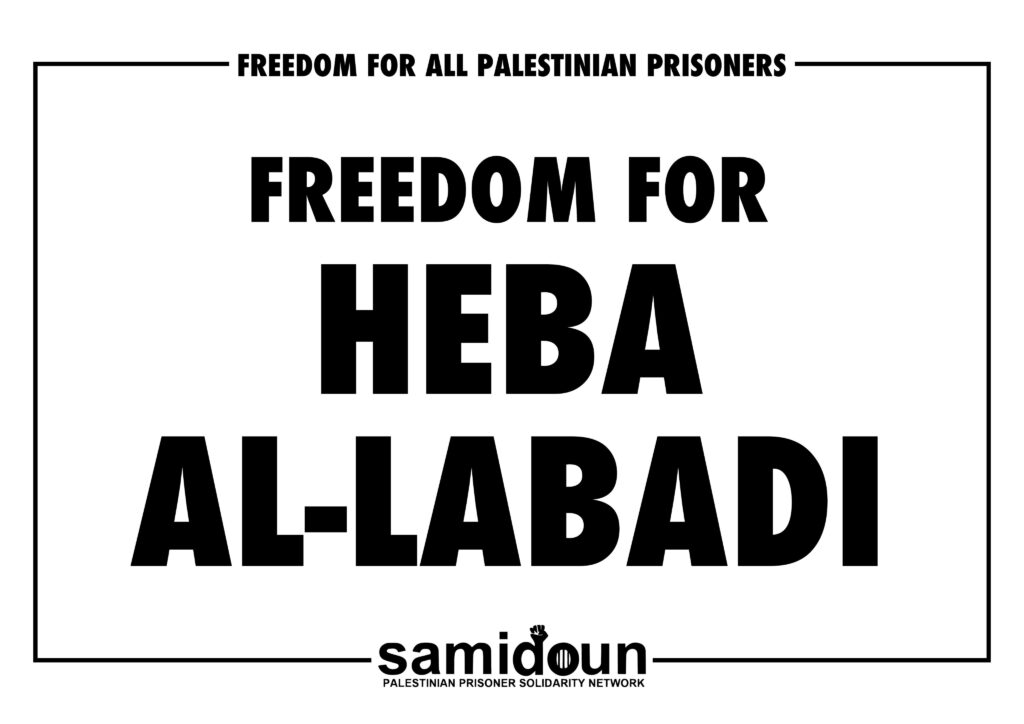
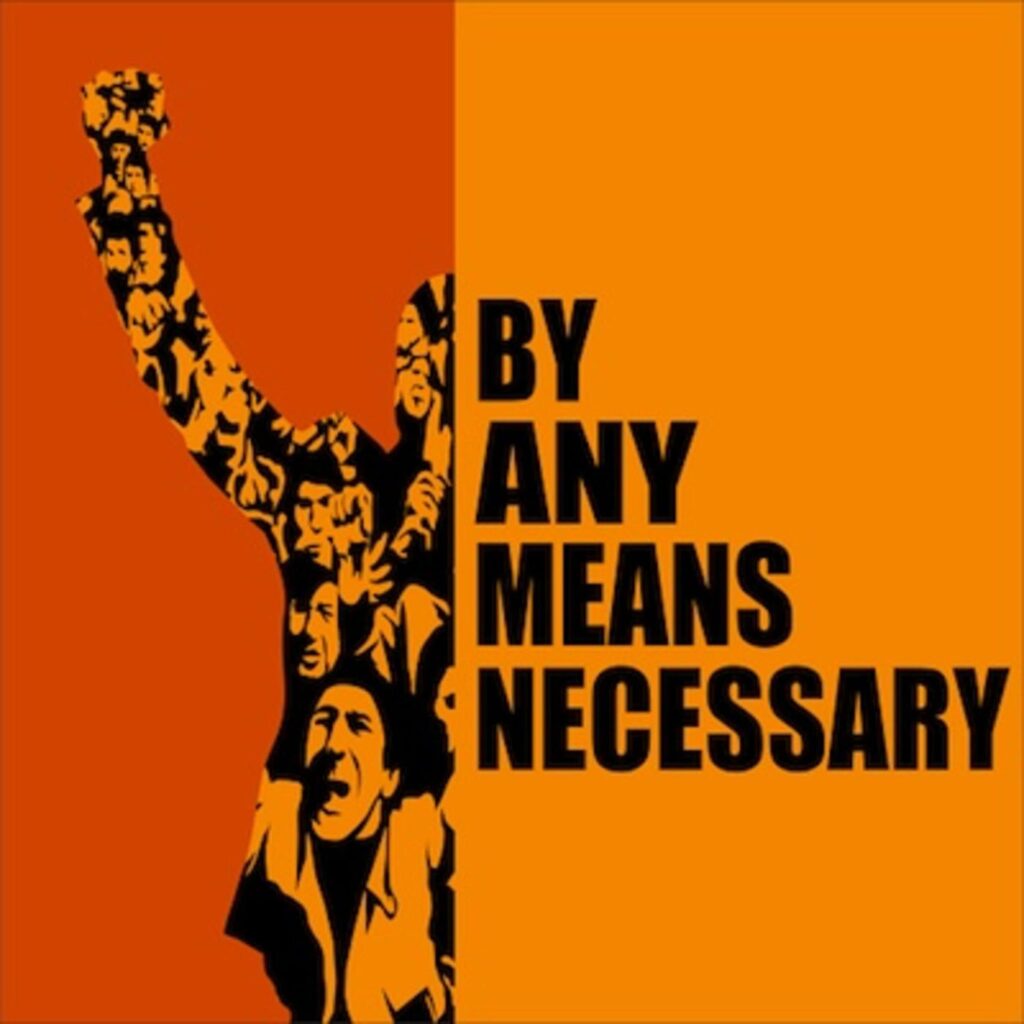
 Take action to demand #ApartheidOffCampus on the 27th November 2019!
Take action to demand #ApartheidOffCampus on the 27th November 2019! As Israel re-arrests Palestinian socialist Khalida Jarrar, another female prisoner Heba Labadi faces a deteriorating condition in her hunger strike for freedom. Join us on the streets to break the silence of British politicians on the Palestinian prisoners in Zionist jails and support the Samidoun call for action!
As Israel re-arrests Palestinian socialist Khalida Jarrar, another female prisoner Heba Labadi faces a deteriorating condition in her hunger strike for freedom. Join us on the streets to break the silence of British politicians on the Palestinian prisoners in Zionist jails and support the Samidoun call for action! Join CUNY Law SJP on Friday, November 8th for a discussion featuring lawyers and activists Lamis Deek and Huwaida Arraf, and CUNY law student Nerdeen Kiswani, on movement lawyering in the context of the Palestine movement. Our panelists will explore the state of the national movement in Palestine, civil liberty violations and challenges faced by Palestinians, and the legal challenges on an international, domestic, and local scale. Tarek Ismail will be moderating.
Join CUNY Law SJP on Friday, November 8th for a discussion featuring lawyers and activists Lamis Deek and Huwaida Arraf, and CUNY law student Nerdeen Kiswani, on movement lawyering in the context of the Palestine movement. Our panelists will explore the state of the national movement in Palestine, civil liberty violations and challenges faced by Palestinians, and the legal challenges on an international, domestic, and local scale. Tarek Ismail will be moderating.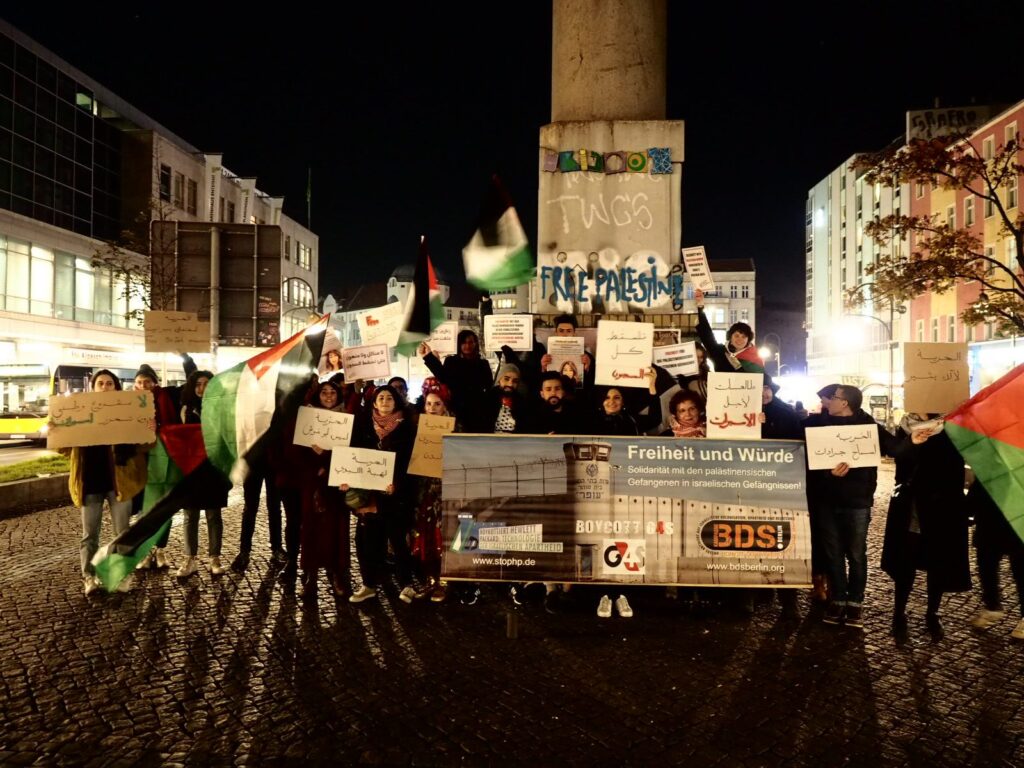


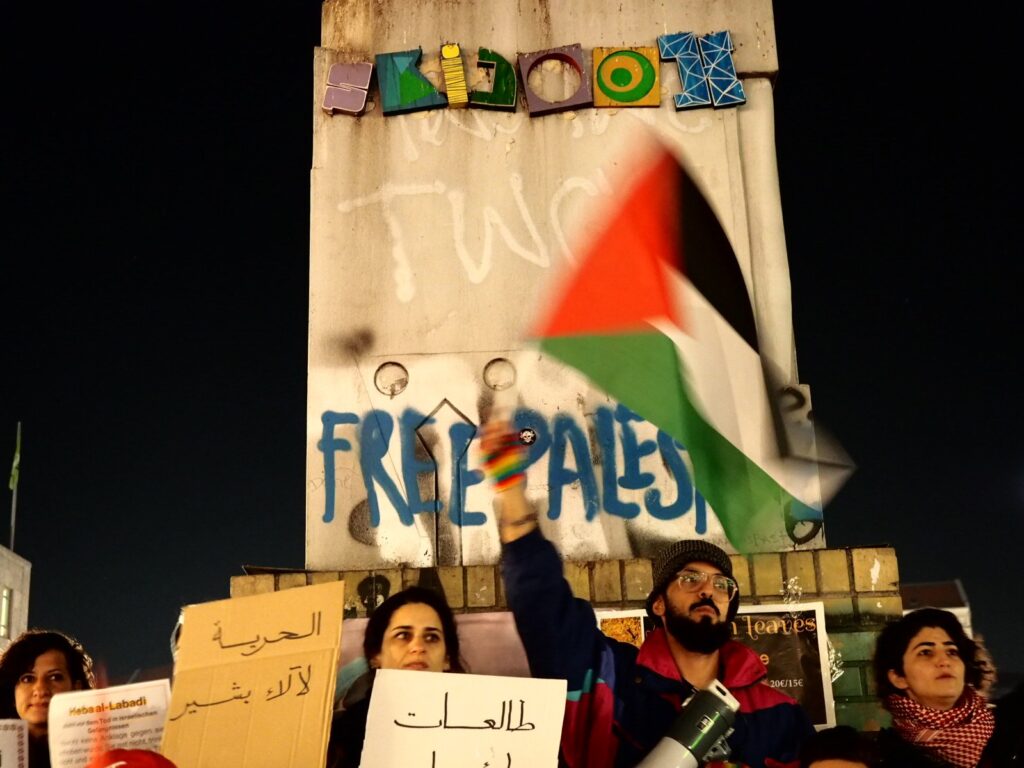
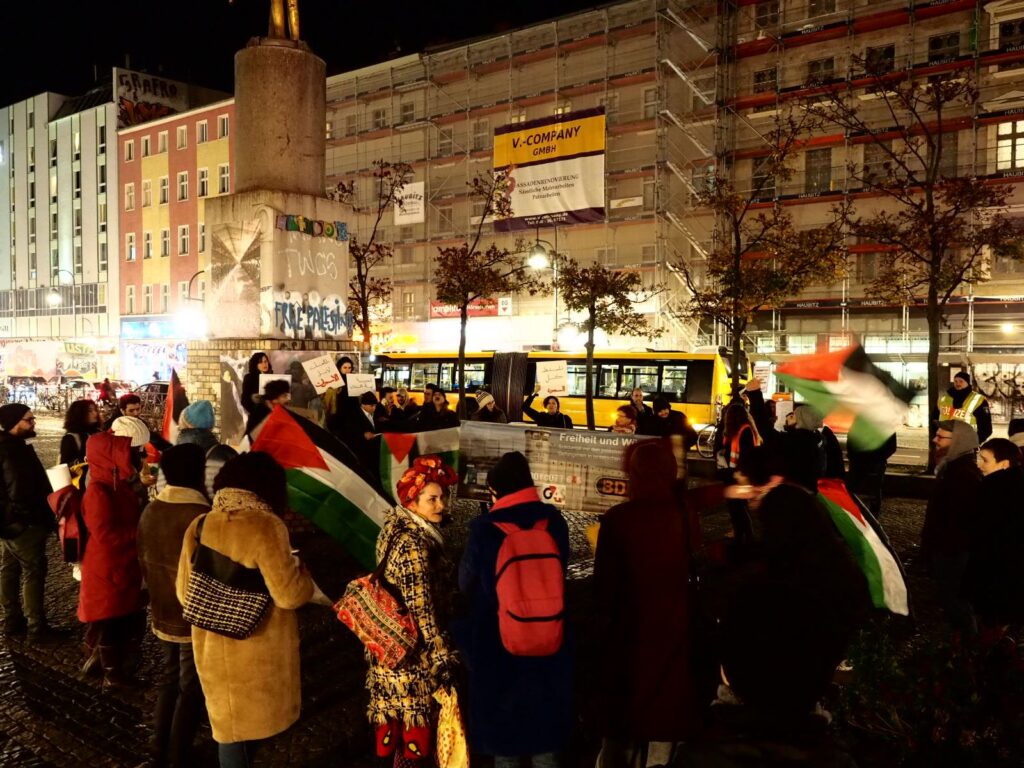
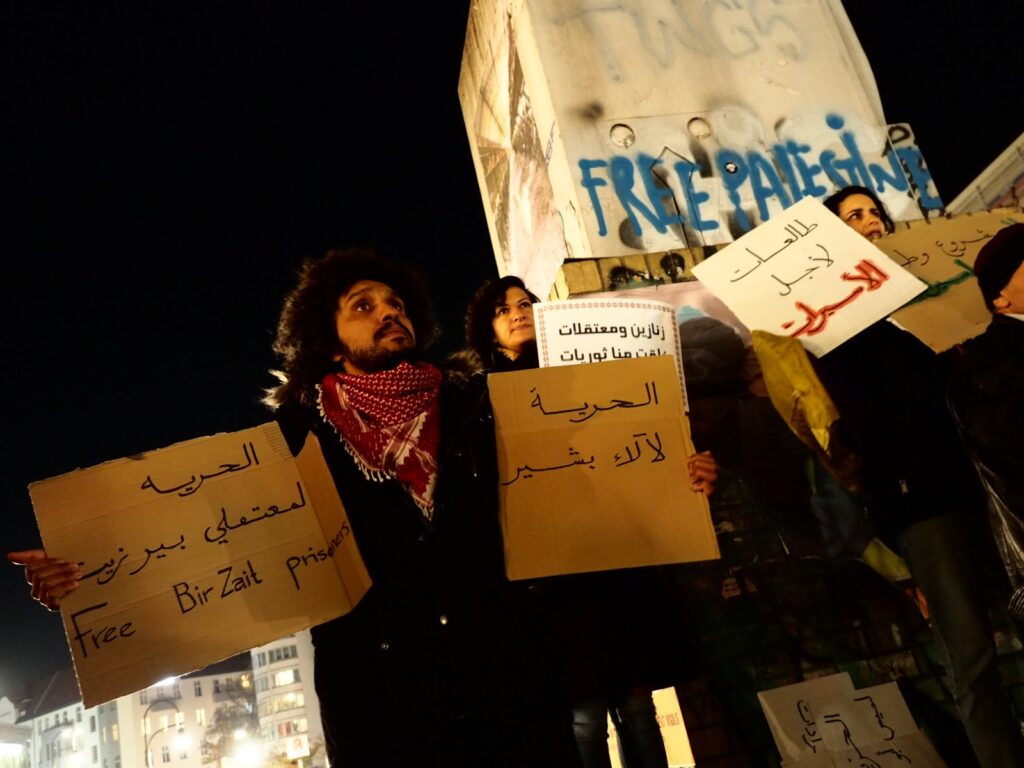
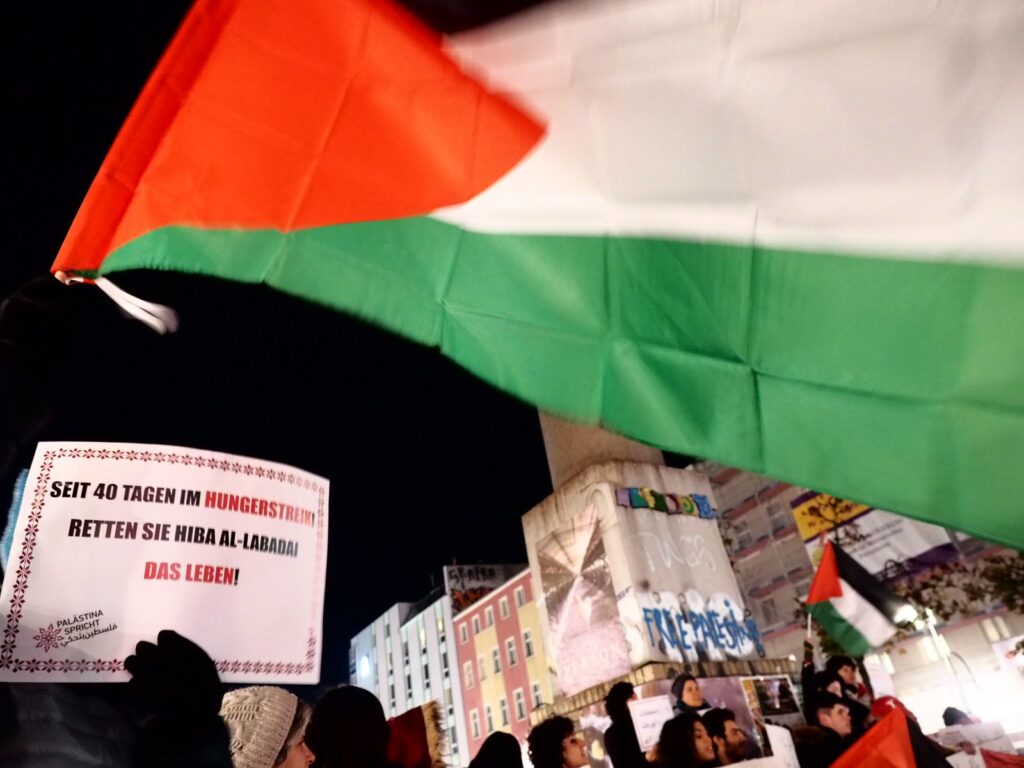
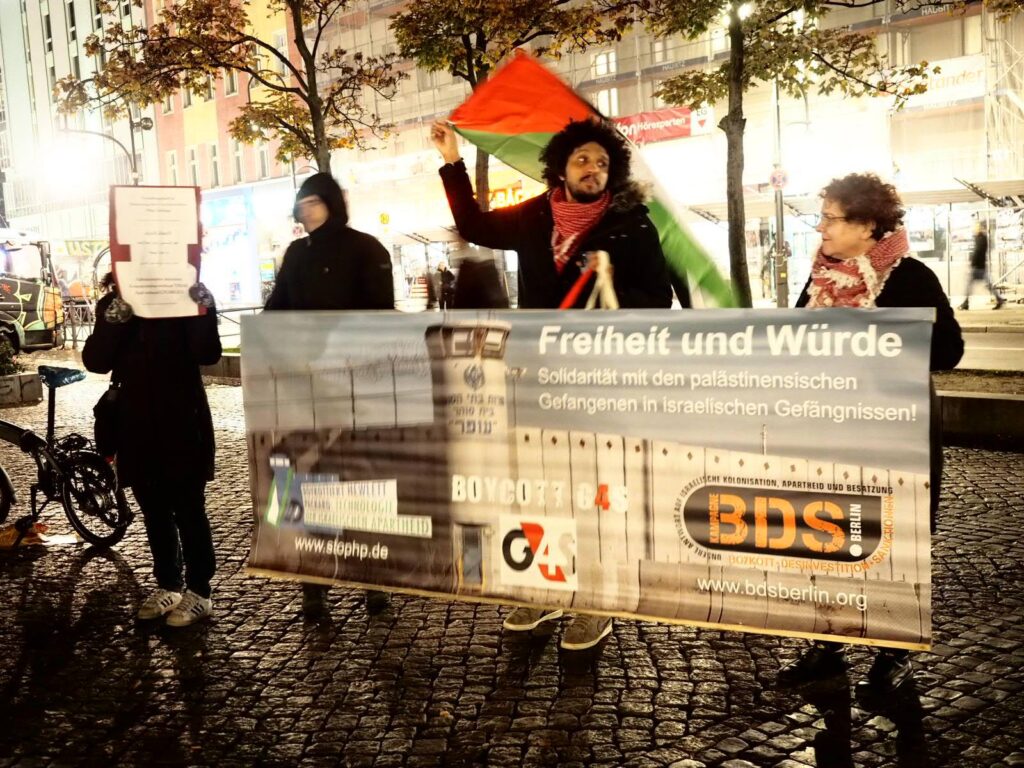
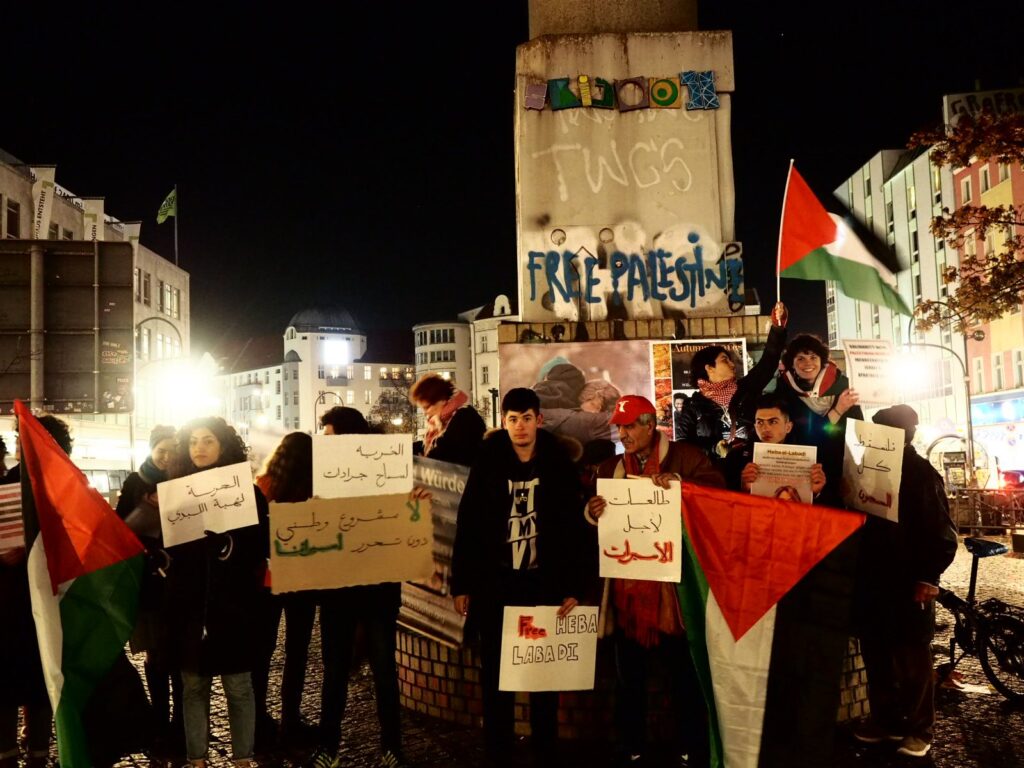
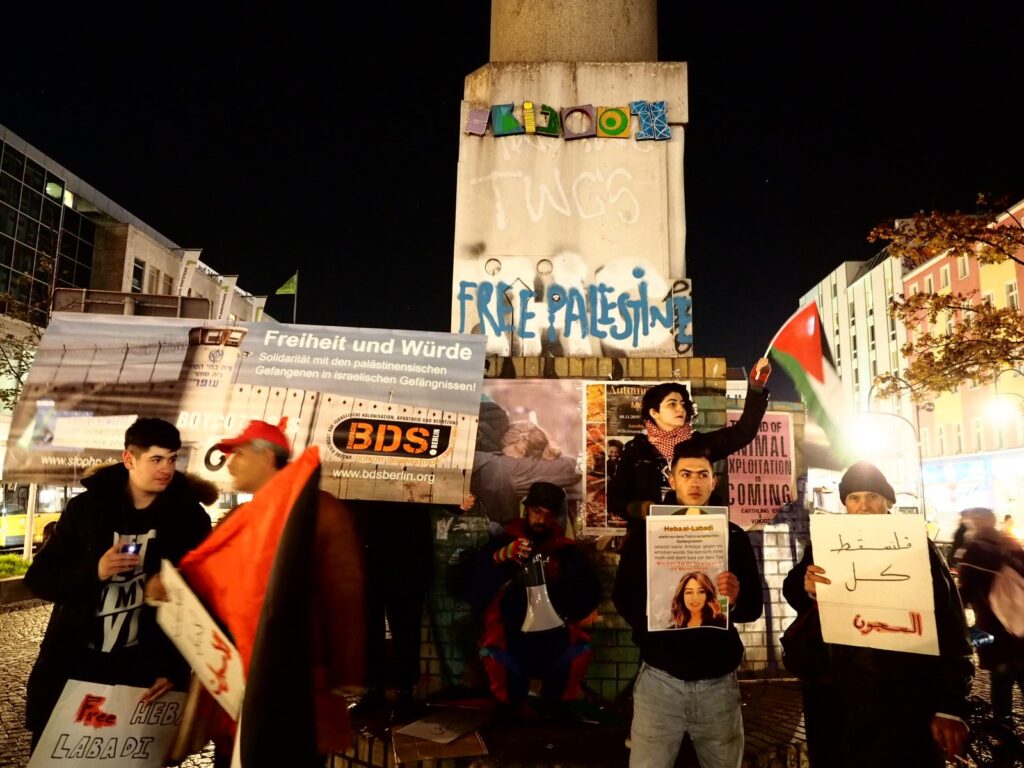




 This was not the only time that Jarrar was imprisoned by the Israeli occupation; her arrest in 2017 came only 13 months after she was
This was not the only time that Jarrar was imprisoned by the Israeli occupation; her arrest in 2017 came only 13 months after she was